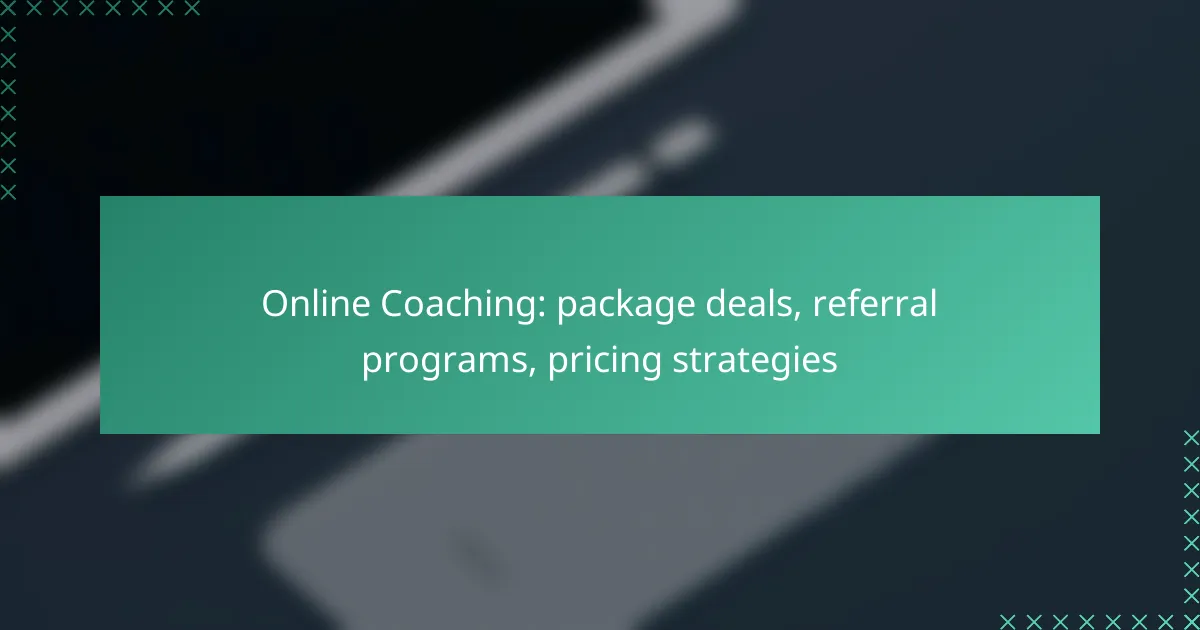Online coaching has become increasingly popular, and effective package deals can offer clients tailored options that fit their needs and budgets. By implementing referral programs, coaches can leverage existing client relationships to attract new clients, while thoughtful pricing strategies ensure that services are competitively priced and reflect their value. These elements work together to enhance client engagement and satisfaction in the coaching experience.

What are effective online coaching package deals?
Effective online coaching package deals are structured offerings that provide clients with various options to engage with coaching services at different price points and formats. These packages can enhance client commitment and streamline the coaching process, making it easier for clients to select a plan that fits their needs and budget.
Monthly subscription packages
Monthly subscription packages allow clients to access coaching services on a recurring basis, typically for a fixed fee each month. This model encourages ongoing engagement and accountability, as clients can receive regular support and guidance. Prices for these packages often range from $50 to $300 per month, depending on the level of service provided.
When considering a monthly subscription, it’s essential to evaluate the frequency of sessions and the availability of additional resources, such as workshops or online materials. Clients should also be aware of cancellation policies to avoid unexpected charges.
One-time intensive coaching sessions
One-time intensive coaching sessions are designed for clients seeking focused support on specific issues or goals. These sessions typically last several hours and can be priced between $150 and $600, depending on the coach’s expertise and the session’s depth. This format is ideal for clients who prefer a concentrated approach without long-term commitments.
Clients should prepare for these sessions by identifying their primary objectives and any relevant background information. This preparation can maximize the effectiveness of the time spent with the coach.
Group coaching programs
Group coaching programs offer clients the opportunity to learn and grow alongside others with similar goals, often at a lower cost than individual coaching. These programs can range from $30 to $200 per month, depending on the size of the group and the frequency of meetings. Group settings foster community and shared learning experiences.
When joining a group coaching program, clients should consider the group dynamics and the coach’s ability to facilitate discussions effectively. It’s also beneficial to engage actively with peers to enhance the overall experience.
Customized coaching bundles
Customized coaching bundles allow clients to tailor their coaching experience by combining various services and formats to meet their unique needs. These bundles can include a mix of one-on-one sessions, group coaching, and access to resources, with prices typically starting around $300 and going up based on the components included.
Clients should discuss their specific goals and preferences with the coach to create a bundle that aligns with their objectives. Flexibility in scheduling and the ability to adjust the bundle over time can also be significant advantages of this approach.

How to implement referral programs for online coaching?
Referral programs for online coaching can effectively attract new clients by incentivizing existing ones to recommend your services. A well-structured program not only rewards current clients but also builds trust with potential customers through personal endorsements.
Incentives for existing clients
Offering incentives is crucial for motivating existing clients to refer others. Common incentives include discounts on future sessions, free coaching hours, or exclusive access to special content. For example, a coach might provide a 20% discount for every new client referred, which can encourage clients to actively promote your services.
Consider creating tiered rewards where the benefits increase with the number of referrals. This can foster ongoing engagement and loyalty among your clients, as they feel recognized for their contributions.
Partnerships with influencers
Collaborating with influencers in the coaching niche can amplify your referral program’s reach. Influencers can share their positive experiences with your services, encouraging their followers to try you out. This strategy leverages their established trust and audience, making it easier to attract new clients.
Choose influencers whose values align with your coaching philosophy. A well-placed endorsement can lead to a significant increase in referrals, especially if the influencer has a dedicated following interested in personal development or coaching.
Referral tracking tools
Implementing referral tracking tools is essential for measuring the effectiveness of your program. These tools help you monitor who referred whom and track the rewards earned. Popular options include referral management software or CRM systems that offer referral tracking features.
When selecting a tool, consider its ease of use, integration with your existing systems, and reporting capabilities. A good tracking tool will provide insights into which incentives are most effective, allowing you to refine your approach over time.

What are the pricing strategies for online coaching?
Pricing strategies for online coaching involve various methods to set rates that reflect the value provided while remaining competitive. Common strategies include value-based pricing, competitive analysis pricing, and tiered pricing models, each with its own considerations and benefits.
Value-based pricing
Value-based pricing focuses on setting prices based on the perceived value of the coaching service to the client rather than the cost of delivering it. This approach requires understanding the specific outcomes clients seek and how much they are willing to pay for those results.
For example, if a coaching program significantly improves a client’s career prospects or personal well-being, the price can reflect that high value. Coaches should gather client feedback and testimonials to gauge perceived value and adjust pricing accordingly.
Competitive analysis pricing
Competitive analysis pricing involves researching what similar coaching services charge to determine a competitive rate. This strategy helps ensure that prices are aligned with market expectations while also considering the unique offerings of the coach.
Coaches should analyze competitors’ pricing structures, service offerings, and client reviews. It’s beneficial to position oneself slightly above or below competitors based on unique selling points, such as specialized expertise or additional resources provided.
Tiered pricing models
Tiered pricing models offer clients multiple pricing options based on different levels of service or access. This approach allows clients to choose a package that best fits their needs and budget, increasing the likelihood of engagement.
For instance, a coach might offer a basic package with limited sessions, a standard package with additional resources, and a premium package that includes one-on-one consultations and personalized plans. This flexibility can attract a wider range of clients and maximize revenue potential.

What are the benefits of package deals in online coaching?
Package deals in online coaching offer several advantages, including cost savings for clients and enhanced commitment to their coaching journey. These bundled services encourage clients to engage more deeply, leading to better outcomes and satisfaction.
Increased client retention
Offering package deals can significantly boost client retention rates. When clients invest in a series of sessions, they are more likely to stay committed to their goals and the coaching process. This long-term engagement can foster a stronger coach-client relationship, which is essential for achieving desired results.
Additionally, clients who purchase packages often feel a sense of accountability, as they have already committed financially. This can lead to higher completion rates for programs and a more consistent coaching experience.
Enhanced perceived value
Package deals can enhance the perceived value of coaching services. By bundling multiple sessions or services, coaches can present a more attractive offer that appears to deliver greater benefits than individual sessions. Clients often perceive they are receiving more for their investment, which can lead to higher satisfaction and referrals.
For example, a coach might offer a package that includes five sessions for a lower rate than purchasing each session separately. This not only saves clients money but also positions the coach as providing comprehensive support, which can be appealing in a competitive market.
Streamlined service delivery
Package deals can streamline service delivery by allowing coaches to plan and organize their schedules more effectively. When clients book multiple sessions at once, coaches can create a structured program tailored to the client’s needs, ensuring a cohesive coaching experience.
This approach also reduces administrative tasks associated with scheduling individual sessions, allowing coaches to focus more on delivering quality content and support. Additionally, it can facilitate better tracking of client progress over time, making it easier to adjust strategies as needed.

How to choose the right referral program for your coaching business?
Choosing the right referral program for your coaching business involves understanding your audience, the effectiveness of incentives, and how scalable the program is. A well-structured referral program can enhance client acquisition and retention while aligning with your business goals.
Assess target audience alignment
Understanding your target audience is crucial when selecting a referral program. Analyze their demographics, interests, and motivations to ensure the program resonates with them. For instance, if your coaching clients are primarily young professionals, consider incentives that appeal to their lifestyle, such as discounts on future sessions or exclusive content.
Utilize surveys or feedback forms to gather insights about what your clients value most. This information can guide you in tailoring the referral program to meet their expectations and increase participation.
Evaluate incentive effectiveness
The effectiveness of your referral program hinges on the incentives you offer. Common options include monetary rewards, service discounts, or free sessions. Choose incentives that are attractive yet sustainable for your business model. For example, offering a 10% discount on future sessions may encourage referrals without significantly impacting your revenue.
Test different incentives to see which ones yield the best results. Tracking referral rates and client feedback can help you refine your approach and maximize the program’s effectiveness.
Consider program scalability
Scalability is vital for a referral program’s long-term success. Ensure that the program can grow with your business without requiring extensive resources. For instance, a digital referral system can automate tracking and rewards, making it easier to manage as your client base expands.
Plan for potential growth by establishing clear guidelines and processes. This includes setting limits on rewards and defining how referrals are tracked. A well-structured program can adapt to increased demand while maintaining quality and client satisfaction.
